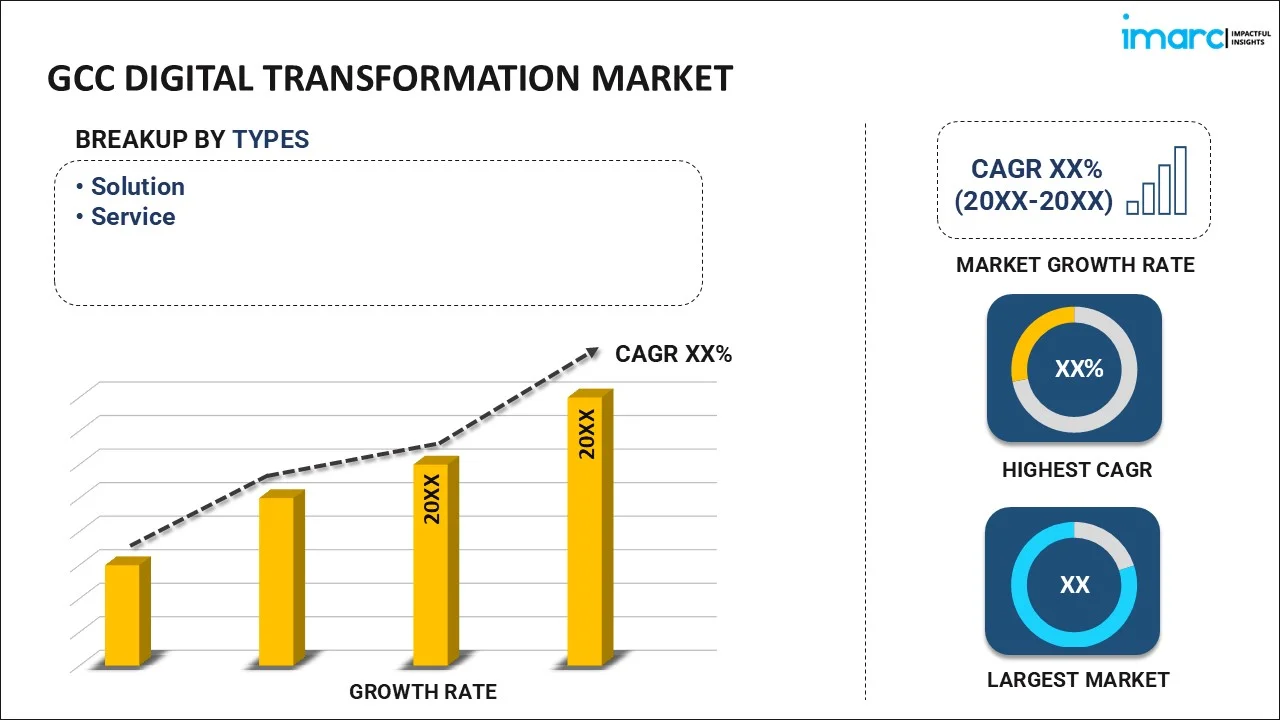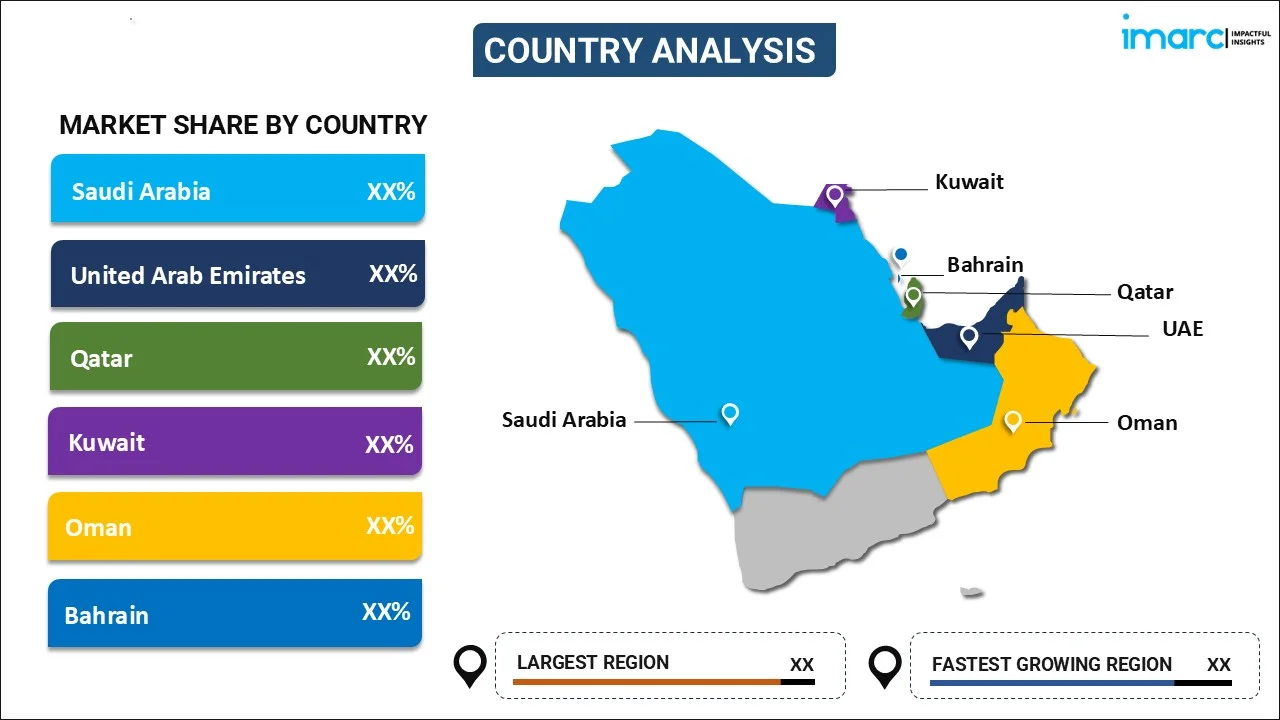
GCC Digital Transformation Market Report by Type (Solution, Service), Deployment Mode (Cloud-based, On-premises), Enterprise Size (Large Enterprises, Small and Medium-sized enterprises), End Use Industry (BFSI, Manufacturing and Retail, Government, Healthcare, IT and Telecom, and Others), and Country 2026-2034
Market Overview:
The GCC digital transformation market size reached USD 25.1 Billion in 2025. Looking forward, IMARC Group expects the market to reach USD 171.0 Billion by 2034, exhibiting a growth rate (CAGR) of 23.75% during 2026-2034. The introduction of strategic plans and frameworks by the regional governments, rapid proliferation of technologies, growing emphasis on streamlining operations, rising focus on personalizing the customer experience, and increasing expansion of e-commerce platforms represent some of the key factors driving the market.
|
Report Attribute
|
Key Statistics
|
|---|---|
|
Base Year
|
2025
|
|
Forecast Years
|
2026-2034
|
|
Historical Years
|
2020-2025
|
|
Market Size in 2025
|
USD 25.1 Billion |
|
Market Forecast in 2034
|
USD 171.0 Billion |
| Market Growth Rate 2026-2034 | 23.75% |
Access the full market insights report Request Sample
Digital transformation refers to the fusion of digital technology into every facet of a business, fundamentally altering the way in which the organization functions and creates value for its customers. It involves both technological and cultural changes, requiring organizations to constantly challenge existing practices, innovate, and adjust to novel operational methods. The sphere of digital transformation encompasses areas, such as business process transformation, business model transformation, domain transformation, and cultural transformation. It finds numerous applications in healthcare, retail, finance, education, manufacturing, government, energy, transportation, hospitality, technology, telecommunications, agriculture, automotive, media, logistics, and construction. Digital transformation aids businesses in achieving increased efficiency, elevated customer experience, greater agility, enhanced decision-making, and streamlined processes. It further facilitates collaboration, customization of products/services, expansion of reach, adherence to regulations, reduction in operational expenses, strengthening of competitive position, smooth integration, and bolstering of security measures. Additionally, digital transformation grants several distinct advantages, such as sophisticated analytics, responsiveness in adapting to market fluctuations, alignment of business strategies, and heightened levels of customer satisfaction.
GCC Digital Transformation Market Trends:
The introduction of strategic plans and frameworks by the regional governments to support digital transformations to enhance the efficiency and accessibility of digitized services in propelling the market growth. Furthermore, the rapid proliferation of technologies, such as the Internet of Things (IoT), cloud computing, and artificial intelligence (AI), to accelerate the adoption of digital transformation, enhance capabilities, and increase efficiency is supporting the market growth. Additionally, the growing emphasis on streamlining operations and saving costs is acting as another growth-inducing factor. Apart from this, the rising focus on personalizing the customer experience and offering seamless digital interfaces is prompting businesses to invest in digital channels, which is further bolstering the market growth. Moreover, the increasing expansion of the e-commerce platforms in the region, which is necessitating the digital transformation of traditional retail stores, is supporting the market growth.. Along with this, the rising internet penetration, which allows businesses across the region to leverage digital technologies, is catalyzing the market growth. Furthermore, the rising emphasis on training and upskilling the workforce in digital competencies is positively impacting the market growth. Moreover, the growing focus on sustainability, which prompts businesses to digital solutions that minimize environmental impact and align with sustainability goals, is fueling the market growth.
GCC Digital transformation Market Segmentation:
IMARC Group provides an analysis of the key trends in each segment of the GCC digital transformation market report, along with forecasts at the regional and country levels for 2026-2034. Our report has categorized the market based on type, deployment mode, enterprise size, and end use industry.
Type Insights:

To get detailed segment analysis of this market Request Sample
- Solution
- Analytics
- Cloud Computing
- Mobility
- Social Media
- Others
- Service
- Professional Services
- Integration and Implementation
The report has provided a detailed breakup and analysis of the market based on the type. This includes solution (analytics, cloud computing, mobility, social media, and others) and service (professional services and integration and implementation).
Deployment Mode Insights:
- Cloud-based
- On-premises
The report has provided a detailed breakup and analysis of the market based on the deployment mode. This includes cloud-based and on-premises.
Enterprise Size Insights:
- Large Enterprises
- Small and Medium-sized enterprises
The report has provided a detailed breakup and analysis of the market based on the enterprise size. This includes large enterprises and small and medium-sized enterprises.
End Use Industry Insights:
- BFSI
- Manufacturing and Retail
- Government
- Healthcare
- IT and Telecom
- Others
The report has provided a detailed breakup and analysis of the market based on the end use industry. This includes BFSI, manufacturing and retail, government, healthcare, IT and Telecom, and others.
Country Insights:

To get detailed regional analysis of this market Request Sample
- Saudi Arabia
- UAE
- Qatar
- Bahrain
- Kuwait
- Oman
The report has also provided a comprehensive analysis of all the major regional markets, which include Saudi Arabia, UAE, Qatar, Bahrain, Kuwait, and Oman.
Competitive Landscape:
The report has also provided a comprehensive analysis of the competitive landscape in the market. Competitive analysis such as market structure, key player positioning, top winning strategies, competitive dashboard, and company evaluation quadrant has been covered in the report. Also, detailed profiles of all major companies have been provided.
GCC Digital transformation Market Report Coverage:
| Report Features | Details |
|---|---|
| Base Year of the Analysis | 2025 |
| Historical Period | 2020-2025 |
| Forecast Period | 2026-2034 |
| Units | Billion USD |
| Scope of the Report | Exploration of Historical and Forecast Trends, Industry Catalysts and Challenges, Segment-Wise Historical and Predictive Market Assessment:
|
| Types Covered |
|
| Deployment Modes Covered | Cloud-based, On-premises |
| Enterprise Sizes Covered | Large Enterprises, Small and Medium-sized enterprises |
| End Use Industries Covered | BFSI, Manufacturing and Retail, Government, Healthcare, IT and Telecom, Others |
| Countries Covered | Saudi Arabia, UAE, Qatar, Bahrain, Kuwait, Oman |
| Customization Scope | 10% Free Customization |
| Post-Sale Analyst Support | 10-12 Weeks |
| Delivery Format | PDF and Excel through Email (We can also provide the editable version of the report in PPT/Word format on special request) |
Key Questions Answered in This Report:
- How has the GCC digital transformation market performed so far and how will it perform in the coming years?
- What has been the impact of COVID-19 on the GCC digital transformation market?
- What is the breakup of the GCC digital transformation market on the basis of type?
- What is the breakup of the GCC digital transformation market on the basis of deployment mode?
- What is the breakup of the GCC digital transformation market on the basis of enterprise size?
- What is the breakup of the GCC digital transformation market on the basis of end use industry?
- What are the various stages in the value chain of the GCC digital transformation market?
- What are the key driving factors and challenges in the GCC digital transformation market?
- What is the structure of the GCC digital transformation market and who are the key players?
- What is the degree of competition in the GCC digital transformation market?
Key Benefits for Stakeholders:
- IMARC’s report offers a comprehensive quantitative analysis of various market segments, historical and current market trends, market forecasts, and dynamics of the GCC digital transformation market from 2020-2034.
- The research study provides the latest information on the market drivers, challenges, and opportunities in the GCC digital transformation market.
- Porter's five forces analysis assist stakeholders in assessing the impact of new entrants, competitive rivalry, supplier power, buyer power, and the threat of substitution. It helps stakeholders to analyze the level of competition within the GCC digital transformation industry and its attractiveness.
- Competitive landscape allows stakeholders to understand their competitive environment and provides an insight into the current positions of key players in the market.
Need more help?
- Speak to our experienced analysts for insights on the current market scenarios.
- Include additional segments and countries to customize the report as per your requirement.
- Gain an unparalleled competitive advantage in your domain by understanding how to utilize the report and positively impacting your operations and revenue.
- For further assistance, please connect with our analysts.
 Request Customization
Request Customization
 Speak to an Analyst
Speak to an Analyst
 Request Brochure
Request Brochure
 Inquire Before Buying
Inquire Before Buying




.webp)




.webp)












